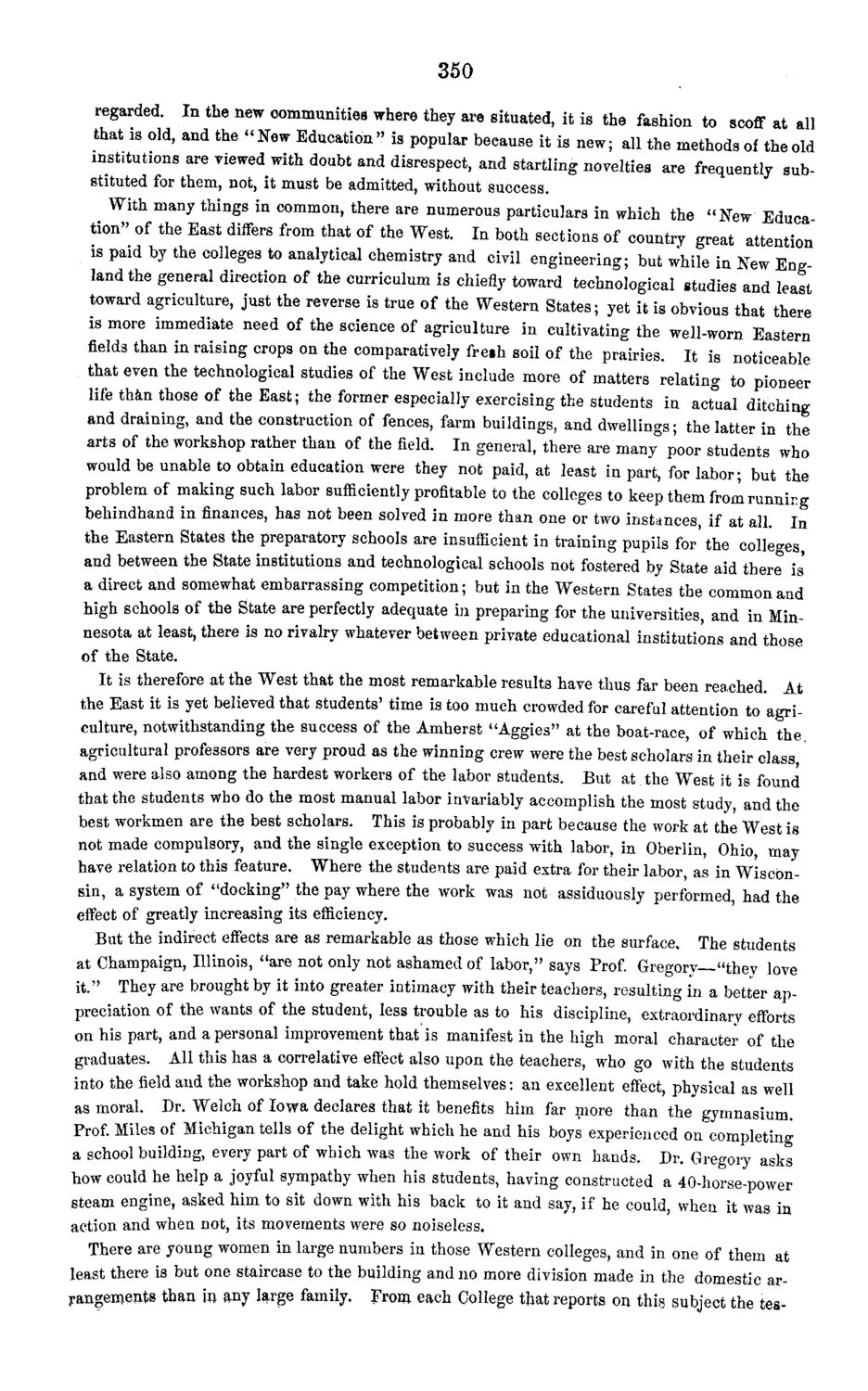| |
| |
Caption: Board of Trustees Minutes - 1871
This is a reduced-resolution page image for fast online browsing.

EXTRACTED TEXT FROM PAGE:
350 regarded. In the new communities where they are situated, it is the fashion to scoff at all that is old, and the "New Education" is popular beeause it is new; all the methods of the old institutions are viewed with doubt and disrespect, and startling novelties are frequently substituted for them, not, it must be admitted, without success. With many things in common, there are numerous particulars in which the "New Educa tion" of the East differs from that of the West. In both sections of country great attention is paid by the colleges to analytical chemistry and civil engineering; but while in New England the general direction of the curriculum is chiefly toward technological studies and least toward agriculture, just the reverse is true of the Western States; yet it is obvious that there is more immediate need of the science of agriculture in cultivating the well-worn Eastern fields than in raising crops on the comparatively freih soil of the prairies. It is noticeable that even the technological studies of the West include more of matters relating to pioneer life than those of the East; the former especially exercising the students in actual ditching and draining, and the construction of fences, farm buildings, and dwellings; the latter in the arts of the workshop rather than of the field. In general, there are many" poor students who would be unable to obtain education were they not paid, at least in part, for labor; but the problem of making such labor sufficiently profitable to the colleges to keep them from running behindhand in finances, has not been solved in more than one or two instances, if at all. In the Eastern States the preparatory schools are insufficient in training pupils for the colleges and between the State institutions and technological schools not fostered by State aid there is a direct and somewhat embarrassing competition; but in the Western States the common and high schools of the State are perfectly adequate in preparing for the universities, and in Minnesota at least, there is no rivalry whatever between private educational institutions and those of the State. It is therefore at the West that the most remarkable results have thus far been reached. At the East it is yet believed that students' time is too much crowded for careful attention to agriculture, notwithstanding the success of the Amherst "Aggies" at the boat-race, of which the agricultural professors are very proud as the winning crew were the best scholars in their class, and were also among the hardest workers of the labor students. But at the West it is found that the students who do the most manual labor invariably accomplish the most study, and the best workmen are the best scholars. This is probably in part because the work at the West is not made compulsory, and the single exception to success with labor, in Oberlin, Ohio, may have relation to this feature. Where the students are paid extra for their labor, as in Wisconsin, a system of "docking" the pay where the work was not assiduously performed, had the effect of greatly increasing its efficiency. But the indirect effects are as remarkable as those which lie on the surface. The students at Champaign, Illinois, "are not only not ashamed of labor," says Prof. Gregory—"they love it." They are brought by it into greater intimacy with their teachers, resulting in a better appreciation of the wants of the student, less trouble as to his discipline, extraordinary efforts on his part, and a personal improvement that is manifest in the high moral character of the graduates. All this has a correlative effect also upon the teachers, who go with the students into the field and the workshop and take hold themselves: an excellent effect, physical as well as moral. Dr. Welch of Iowa declares that it benefits him far more than the gymnasium. Prof. Miles of Michigan tells of the delight which he and his boys experienced on completing a school building, every part of which was the work of their own hands. Br. Gregory asks how could he help a joyful sympathy when his students, having constructed a 40-horse-power steam engine, asked him to sit down with his back to it and say, if he could, when it was in action and when not, its movements were so noiseless. There are young women in large numbers in those Western colleges, and in one of them at least there is but one staircase to the building and no more division made in the domestic arrangements than in any large family. From each College that reports on this subject the tes-
| |